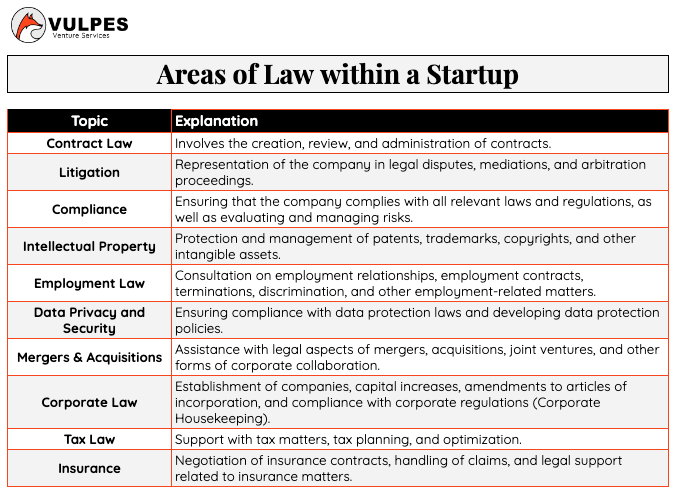Cracking the Startup Legal Code: Make, Buy, or Both?
- Tobias Fuchs
- Nov 10, 2023
- 3 min read
Companies, regardless of their size and life stage, regularly face the challenge of deciding how to structure their legal department. This pivotal decision between "Make" and "Buy" in the realm of legal services not only determines the legal course but also the success of the company in legally complex environments. Let's take a look at the various aspects that come into play when making this decision.
Areas of Law
Before approaching Legal as a Service, it's worth taking a closer look at the broad spectrum of legal areas that a legal department must be proficient in. From contract law to labor law and M&A, the tasks are as diverse as the companies themselves. The precise division of what to handle in-house and what services to procure depends on various factors, including company size, industry standards, and individual requirements. Below is an overview of the different areas of law within a company.

Internal Challenges in Legal Management
Regardless of whether a company chooses the "Make" or "Buy" approach, a significant portion of operational legal management tasks lies within the responsibility of the company. Developing and implementing a clear legal strategy, risk management, ensuring compliance, and efficiently managing the legal department's budget are just a few examples of the key elements a legal department must handle. Below is an overview of the legal topics that should be managed.

Legal as a Service: An Alternative for Startups
Especially for startups that may not have the means for a complete in-house legal department, "Legal as a Service" can be a sensible alternative. These service providers allow cost-effective outsourcing of legal tasks until the company reaches the size to justify its own legal department. In the meantime, the service provider will document processes and archive documents.
The Benefits of Legal as a Service for Startups
In the dynamic landscape of startups, where agility and focus are paramount, Legal as a Service emerges as a strategic ally. Embracing this innovative approach comes with a myriad of advantages, enabling startups to navigate legal complexities with finesse. Let's explore how opting for Legal as a Service can be a game-changer for your startup's growth and success.
Cost Efficiency: Startups can save significant costs on salaries and office space.
Focus on Core Business: Internal teams can concentrate their resources on their core tasks.
Network and Resources: Outsourced legal service providers often have access to a broad network and international legal expertise.
Time Savings: Internal teams can save time that would otherwise be spent managing legal matters.
Risk Management: By outsourcing legal services, startups can better identify and minimize legal risks.
Flexibility: Startups can respond flexibly to their legal requirements without committing to long-term fixed cost structures.
Common Language: Legal business partners speak the language of business, enhancing accessibility to legal issues.
Wide Scope of Services: Legal business partners can offer much more than just legal advice.
Conclusion: The Art of Decision-Making
In conclusion, it can be said that each decision must be made individually. Whether "Make," "Buy," or a hybrid approach, there is no right or wrong. The crucial point is that companies consciously engage with these questions. We invite you to connect with us to collaboratively develop the optimal strategy for your legal department. Legal matters are not a necessary evil but a crucial component for the sustainable success of your company.
The article in short
🔍 First Steps in Legal Management: Start by defining your company's unique legal needs, considering factors like size, industry, and specific requirements. Develop a clear legal strategy, emphasizing risk management, compliance, and budget efficiency.
🔄 Structuring Comes Next: Once the foundational aspects are in place, the "Buy" or "Make" decision becomes more intuitive. Tailor your legal department structure to align with your established strategy, ensuring a seamless integration of legal tasks into your company's overall operations.
🛠️ Adaptability is Key: Remember, there's no one-size-fits-all solution. The beauty lies in adaptability. Whether opting for in-house expertise, external partnerships, or a hybrid model, the structure should flexibly meet your evolving legal needs.
🤝 Collaborative Decision-Making: Engage stakeholders, legal experts, and decision-makers in collaborative discussions. The goal is to craft a legal management framework that not only addresses immediate challenges but also paves the way for long-term success.
🚀 Connecting Strategy with Structure: The integration of legal strategy and departmental structure ensures a holistic and effective approach. It's not just about managing legal matters; it's about strategically aligning them with your company's objectives.
⚖️ Conclusion: So, before choosing between "Buy" or "Make," companies should embark on a thoughtful journey of defining and managing their legal approach. The success of your legal structure lies in the clarity and foresight with which you answer the fundamental question of legal management.
🔗 Let's Start the Conversation: Ready to shape a legal management strategy that propels your company forward? Connect with us to embark on this crucial journey together. Legal excellence is not a destination; it's a continuous process. 🌐🤝


Comments